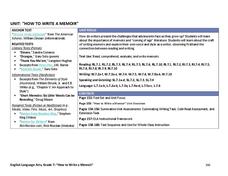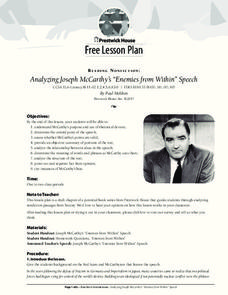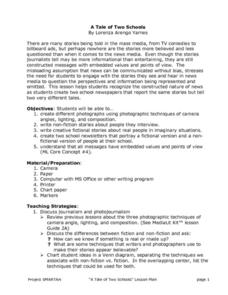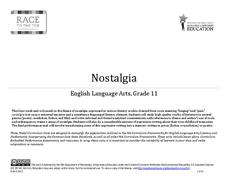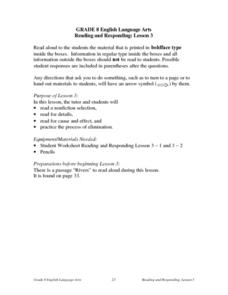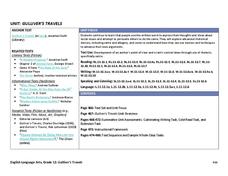Louisiana Department of Education
How to Write a Memoir
Who are we and what shapes our identities? Seventh graders work to answer this question as they learn how to write a memoir. Full of non-print resources and supplemental texts that range from fiction to non-fiction, scholars write their...
Curated OER
All About Our Town
Pupils explore brochure writing. They work in groups to brainstorm and categorize important places in their community. In addition, they gather information from the Internet, take pictures using a digital camera, and create a community...
Madison Public Schools
Journalism
Whether you are teaching a newspaper unit in language arts, covering the First Amendment and censorship in social studies, or focusing on writing ethics in journalism, a unit based on the foundations of journalism would be an excellent...
Curated OER
Nonfiction Genre Mini-Unit: Persuasive Writing
Should primary graders have their own computers? Should animals be kept in captivity? Young writers learn how to develop and support a claim in this short unit on persuasive writing.
Prestwick House
Reading Nonfiction: Analyzing Joseph McCarthy's "Enemies from Within" Speech
Looking for a instructional activity that teaches class members how to analyze nonfiction? Use Joseph McCarthy's famous "Enemies from Within" speech as a instructional text. Worksheet questions direct readers' attention to the many...
Curated OER
Nonfiction Journal Prompts
In this nonfiction journal prompt worksheet, students respond to ten prompts related to a nonfiction book before and while reading the book. What information surprised you, and why did you choose this book are two examples.
Curated OER
Author's Purpose: Research Process/Narrative Writing Techniques
Determine the author's purpose in writing a memoir. Eighth graders work in groups to elicit author's purpose in memoirs, taking care to note how subtle the message can be hidden throughout the work. This lesson is a good way to...
Curated OER
Determining Author's Point of View: The Sneeches
Determine the author's point of view in a text. Young readers read Dr. Seuss' The Sneeches and identify the author's purpose in the story. They identify persuasive techniques in writing, asking and answering questions to better...
Curated OER
Short and Sweet Science
Readers learn how to summarize scientific text and evaluate the advantages, disadvantages, and challenges in writing summaries. They select science-related articles you've pulled and collected from the New York Times and, with a partner,...
Digital Writing and Research Lab's – Lesson Plans
Teaching Close Reading through Short Composition/Revision
This activity may have writers evaluate short compositions, but their subjects are quite tall: great Americans. Pupils read one another's compositions and closely examine how specific phrases and diction contribute to shaping American...
Curated OER
The Purpose and Power of Persuasion
Examine the power of persuasion and have learners consider how it influences events in their own lives. After reading and analyzing informational texts to understand the author's purpose, class members take a written test and craft a...
Curated OER
Lesson Plan 3: Great Book, Gross Book
It's time for your scholars to become book reviewers! Start with a fun review of foods: are they good or gross? Learners apply these evaluation techniques to books, recording their thoughts on large pieces of butcher paper. Simply have...
Curated OER
Language Arts: Awesome Authors Website
Students examine the writing techniques of professional authors and apply them to their own work. In pairs, they email authors to discover the tricks of the trade. Students create their own Website for their work.
Curated OER
A Tale of Two Schools
Students create different photographs using photographic techniques of camera angles, lighting, and composition. They write non-fiction stories about people they interview and create two school newsletters that portray a fictional...
Massachusetts Department of Education
Nostalgia
To prepare for crafting their own memoir, class members examine poetry by Margaret Atwood, Billy Collins, Robert Hayden, and Claude McKay, stories by Richard Rodriquez and Willa Cather, and Barry Levinson's film Avalon. They examine how...
Shmoop
ELA.CCSS.ELA-Literacy.RI.11-12.5: Structure of an Argument
Imagine a cross-curricular project that not only rewards learners for examining the textbooks used in their other classes but builds literacy skills as well! Groups compare the formats and writing style in their various textbooks. Teams...
Curated OER
Imagine That! Analyzing Imagery
Poems by O. Henry, Marion Dane Bauer, Monty Roberts, and Langston Hughes provide the text for a study of symbolism, hyperbole, and imagery. Employing the “think-pair-share” strategy learners generate definitions of these terms and locate...
Curated OER
Making a Non-Fiction Big Book
Writing a non-fiction big book can help students learn about research techniques, note taking, and other skills.
EngageNY
Adding to Cascading Consequences and Stakeholders: Hunter-Gatherer Food Chain
Could the hunter-gatherer food chain feed everyone in the United States? To consider the question, pupils use their research and add to the Cascading Consequences chart based on Michael Pollan's hunter-gatherer food chain from The...
Curated OER
Reading and Responding: Lesson 3
Reinforce comprehension of informational text. This is a one-on-one instructional activity intended to build an internal dialogue the reader can use to boost overall comprehension. They work independently with a tutor or teacher to read...
Louisiana Department of Education
Gulliver’s Travels
Gulliver's Travels tells the story of a man who goes on voyages and encounters strange people. A unit plan introduces readers to the classic text, as well as excerpts from other examples of sarcasm and satire, such as "A Modest Proposal"...
Curated OER
Analyzing the Use of Irony in a Short Story
Ninth graders examine how literature connects to real-life and see how irony aids in the development of theme. They read Shirley Jackson's The Lottery, and discuss elements of foreshadowing and situational irony. Then learners will write...
Curated OER
The Time I Got Lost
Third graders go through the writing process but substitute paper and pencil with the computer to create a story about "The Time I Got Lost".
Curated OER
How Logical is Garfield?
Third graders analyze comics found in the newspaper for samples of logical, emotional, and ethical appeal. They write a paragraph for each selected comic strip explaining how the comic strip represents the use of logic, emotions, or ethics.


